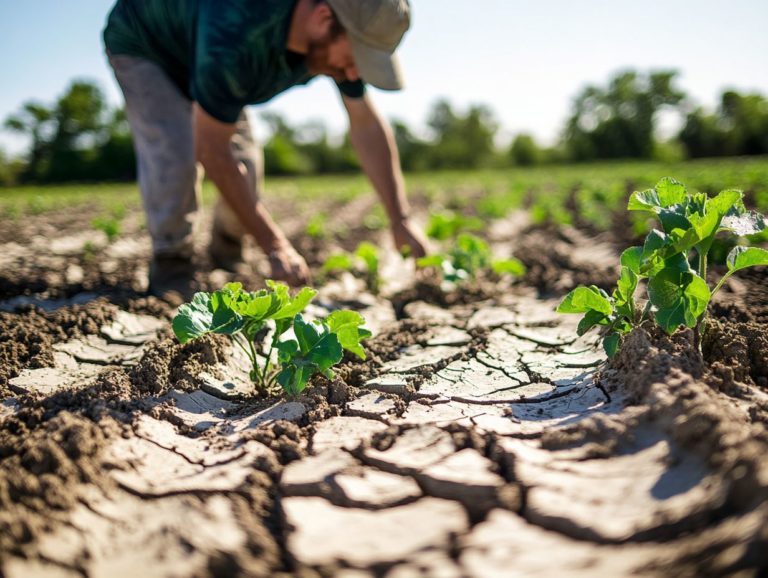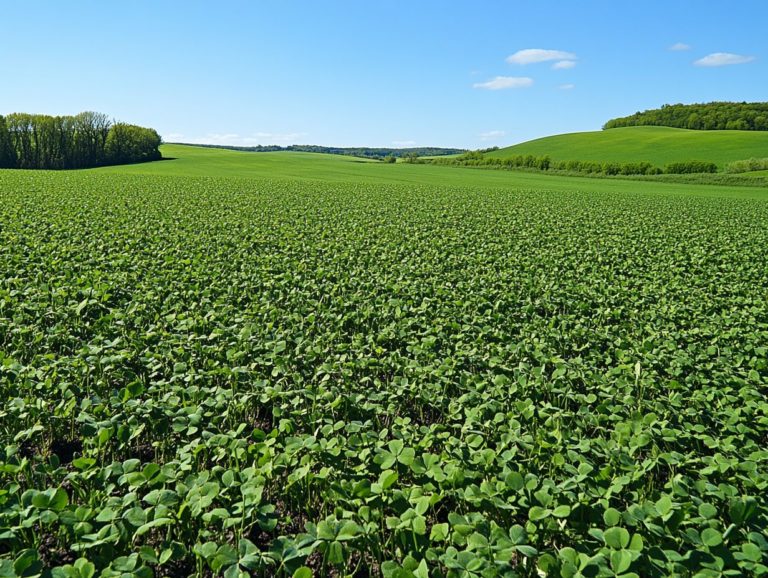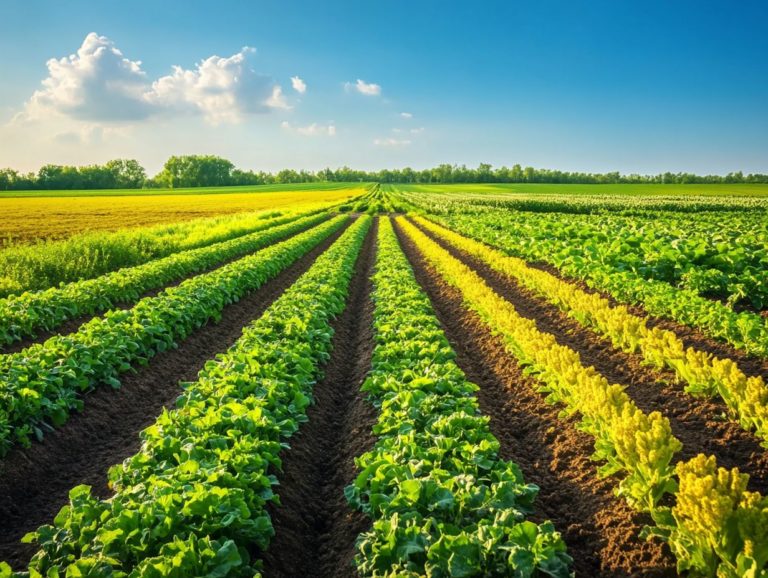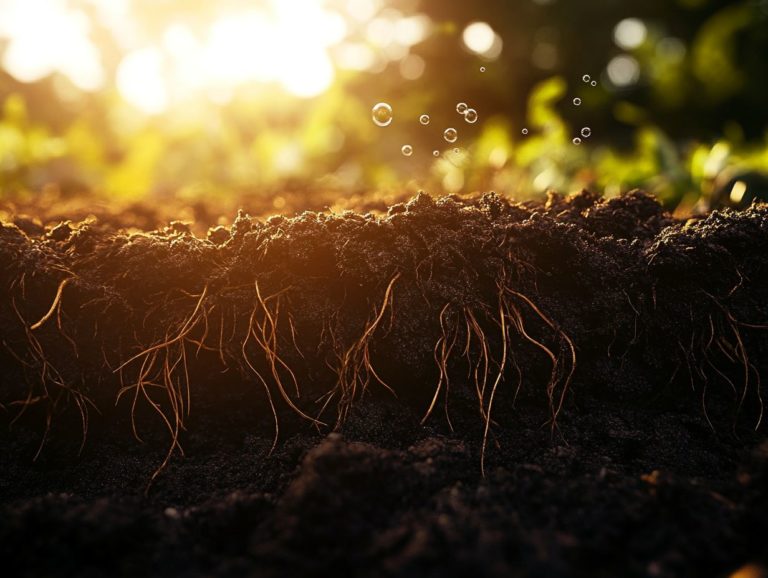Using Biochar to Enhance Soil Quality
Biochar is a game changer for improving soil quality. It promotes sustainability in agriculture.
This article explains what biochar is. It also traces its origins and highlights its significance in agriculture.
You will discover the many benefits of biochar. It enhances soil fertility, improves structure, and helps reduce your carbon footprint.
Explore how biochar works and the best ways to apply it. Understand key considerations for different soil types.
We will discuss potential challenges and practical solutions. This will prepare you to fully benefit from using biochar.
Contents
Key Takeaways:
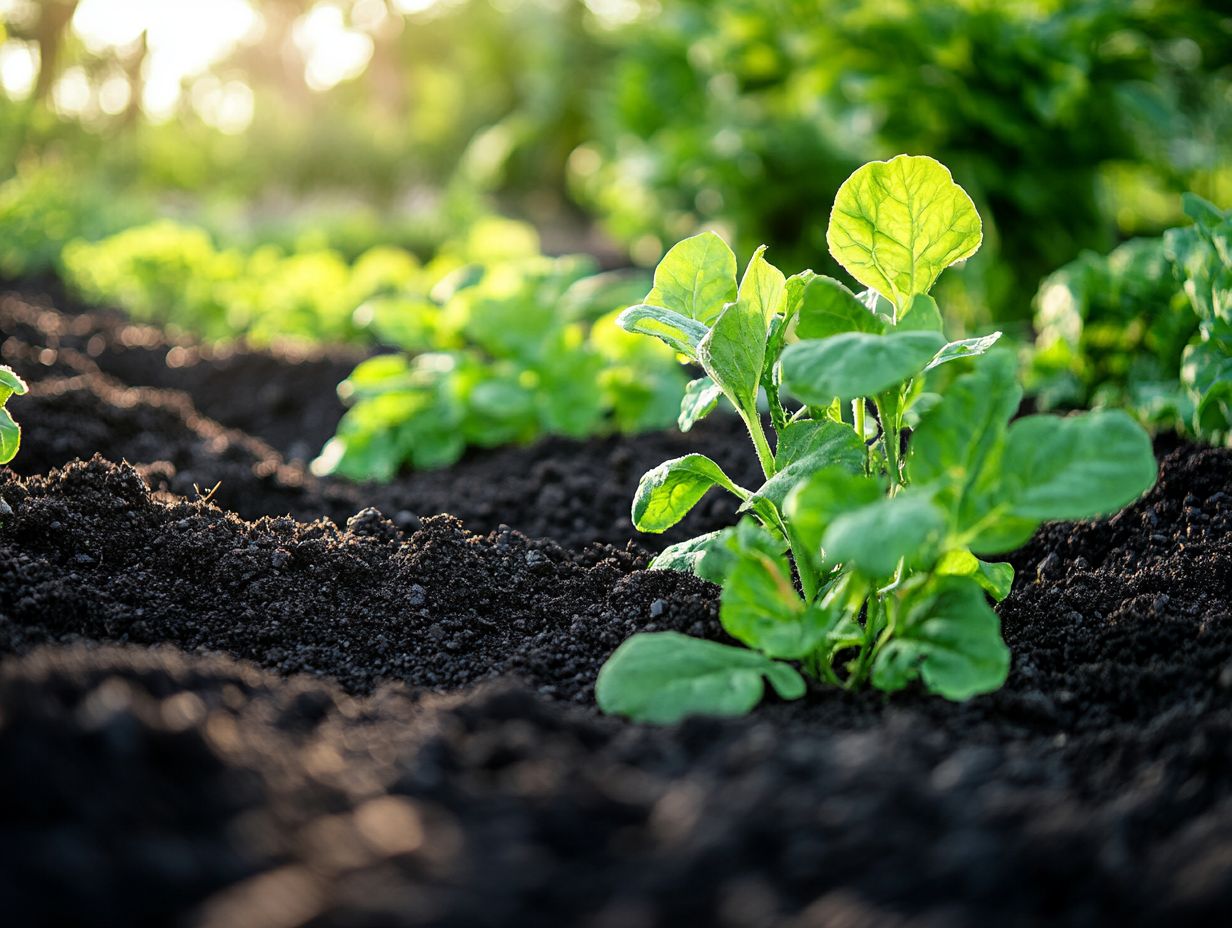
- Biochar is a natural soil amendment made from organic waste heated in low oxygen. It improves soil fertility, structure, and cuts down carbon footprint.
- Biochar holds nutrients, boosts microbial activity, and enhances soil aeration and water retention.
- Understand effective application methods and address limitations based on soil types with proper planning.
What is Biochar?
Biochar is a carbon-rich material produced through a process involving heating organic materials like agricultural by-products and organic waste in a low-oxygen environment. This process, known as pyrolysis, transforms the feedstock into a stable form of carbon that serves as an exceptional soil amendment.
By enhancing soil quality, biochar plays a pivotal role in sustainable agricultural practices. Originating from the legendary Terra Preta soils in the Amazon Basin, biochar has garnered significant attention for its environmental benefits, including carbon sequestration and the improvement of soil properties. It stands out as an essential tool in modern agriculture.
Definition and Origins
The term “biochar” refers to a carbon-rich product created through the pyrolysis of organic materials, with its roots tracing back to the fertile Terra Preta soils of the Amazon Basin. Here, indigenous peoples harnessed biochar to enhance agricultural productivity.
These ancient soils, renowned for their exceptional nutrient retention and fertility, showcase how biochar can revitalize degraded land into flourishing agricultural ecosystems. This historical backdrop underscores the vital role biochar played in sustainable farming practices among early civilizations.
A variety of feedstocks such as agricultural residues, forestry wastes, and municipal solid waste have been utilized in biochar production, each imparting unique nutrients and characteristics to the final product. By integrating biochar derived from these diverse materials into the soil, you can stimulate microbial activity, enhance water retention, and ultimately elevate agricultural crop yields.
This approach fosters a sustainable synergy between contemporary practices and the ancient wisdom of earlier societies.
Benefits of Biochar for Soil
The advantages of biochar for soil are both numerous and profound. It enhances soil fertility, improves soil structure, and significantly boosts nutrient and moisture retention.
These benefits collectively lead to higher crop yields and foster sustainable agricultural practices across a variety of ecosystems.
Improving Soil Fertility and Structure
Biochar is a strong soil amendment. It enhances soil fertility and structure.
It helps nutrient absorption and increases organic matter. This is essential for healthy plant growth and agricultural productivity.
Biochar plays a key role in balancing soil pH levels. This adjustment makes it easier to cultivate a wider range of crops, boosting biodiversity within the agricultural ecosystem.
Moreover, biochar promotes soil aggregation, improving aeration and water retention. In regions like Brazil, where farmers incorporate biochar into their practices, they observe remarkable increases in microbial activity.
Similar success stories are emerging from China. There, the application of biochar has led to enhanced soil health and productivity, showing its potential to revolutionize agricultural landscapes worldwide.
Reducing Carbon Footprint
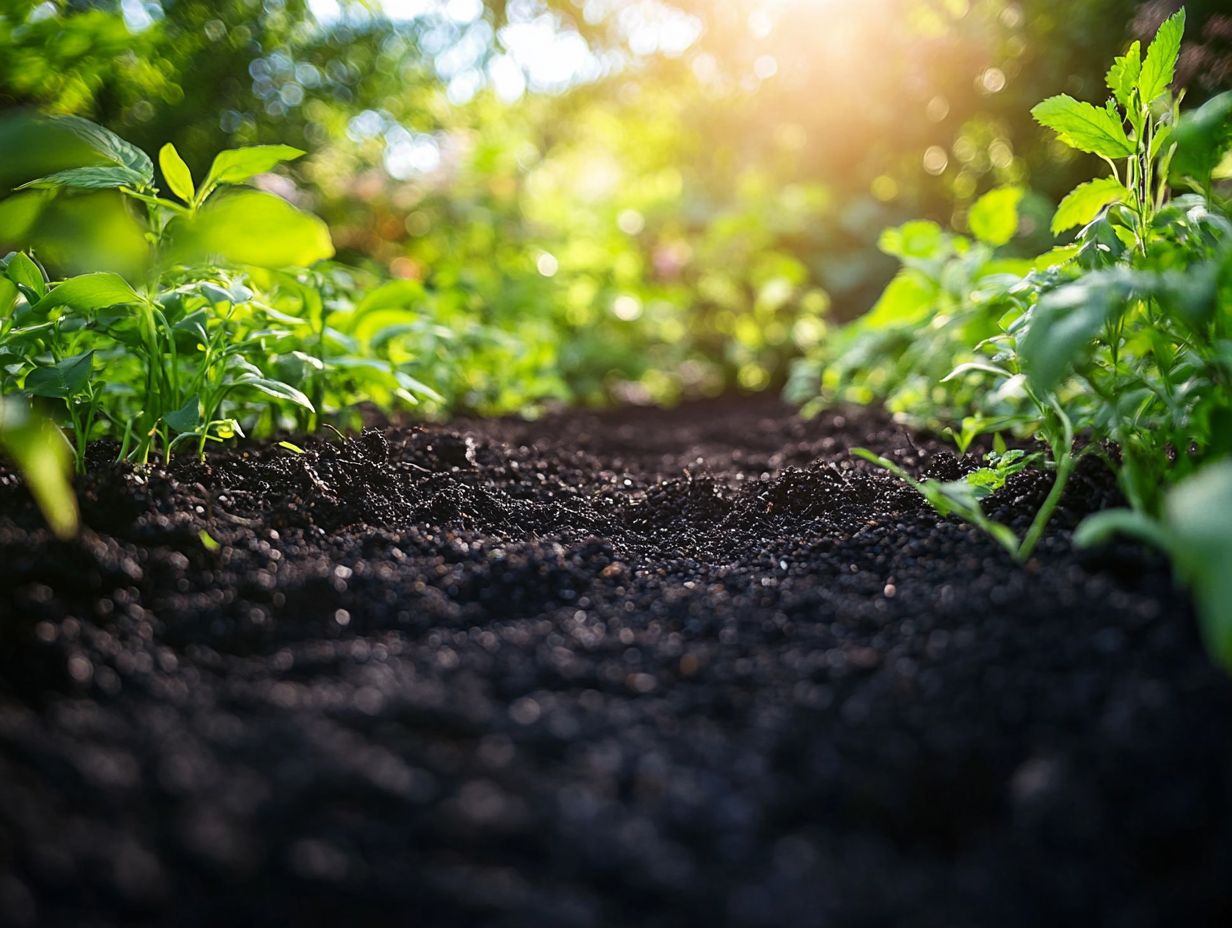
Reduce your carbon footprint with biochar in your farming practices. Biochar captures and stores carbon in the soil, reducing its release into the atmosphere.
By doing so, it not only mitigates greenhouse gas emissions but also aids in the fight against climate change. What’s more, it could even generate carbon credits for you as a farmer.
Its porous structure enhances soil health by improving water retention and nutrient availability. This beneficial relationship means you enjoy immediate farm benefits while contributing to long-term climate solutions.
Policies like the California Air Resources Board’s cap-and-trade program recognize biochar’s significance in reducing emissions. Certifications such as the Verified Carbon Standard facilitate project development. By championing biochar through these initiatives, you and other stakeholders can work together towards a greener future. Adaptable agricultural practices are crucial in tackling the pressing issue of climate change.
How Biochar Works
To truly grasp how biochar functions, you need to understand its influence on soil properties, microbial activity, and nutrient availability. Together, these factors significantly enhance soil health and pave the way for improved agricultural productivity.
The Science Behind Biochar’s Effects
The science behind biochar’s effects lies in its unique physical and chemical properties. These properties enhance your soil microbiology and significantly improve nutrient absorption.
This allows you to make more efficient use of chemical fertilizers while reducing the risk of nutrient leaching. Biochar has a porous structure that increases water-holding capacity and encourages microbial habitation.
Studies from institutions like the University of Florida highlight how these complex surfaces create a welcoming habitat for beneficial bacteria and fungi. This enhances nutrient cycling and promotes robust plant health.
With its high surface area, biochar effectively retains essential nutrients like nitrogen, phosphorus, and potassium. Additionally, its alkalinity helps buffer soil acidity. Research from Michigan State University suggests that these characteristics contribute to improved soil structure, leading to enhanced root development and greater agricultural productivity for you.
How to Use Biochar Effectively
Using biochar effectively requires you to grasp the different application methods. Identifying best practices suited to various soil types ensures optimal nutrient management while delivering long-term benefits for both soil health and crop production.
Ready to transform your soil? Start using biochar today for healthier crops and a greener planet!
Methods of Application
You have several methods for applying biochar, including direct incorporation into the soil, surface application, and mixing it with compost. Each method has unique advantages, particularly in enhancing soil structure and moisture retention.
Select the approach that best fits your soil conditions and cultivation goals to ensure optimal nutrient management. Direct incorporation allows for deeper integration within the soil, improving nutrient availability and promoting beneficial microbial activity. However, this method may require more labor and the use of heavy machinery, such as tractors or tillers.
Surface application is less labor-intensive and can quickly elevate soil carbon levels. Yet, it may not be as effective for optimizing nutrient retention compared to incorporation. Mixing biochar with compost boosts microbial activity and improves the process of nutrients moving through the soil and plants, though achieving a balanced compost blend can sometimes pose challenges.
To successfully integrate biochar, start with small trial areas to monitor benefits. Adjust the application rate based on soil tests. Act now to ensure your soil remains healthy and productive!
Considerations for Different Soil Types
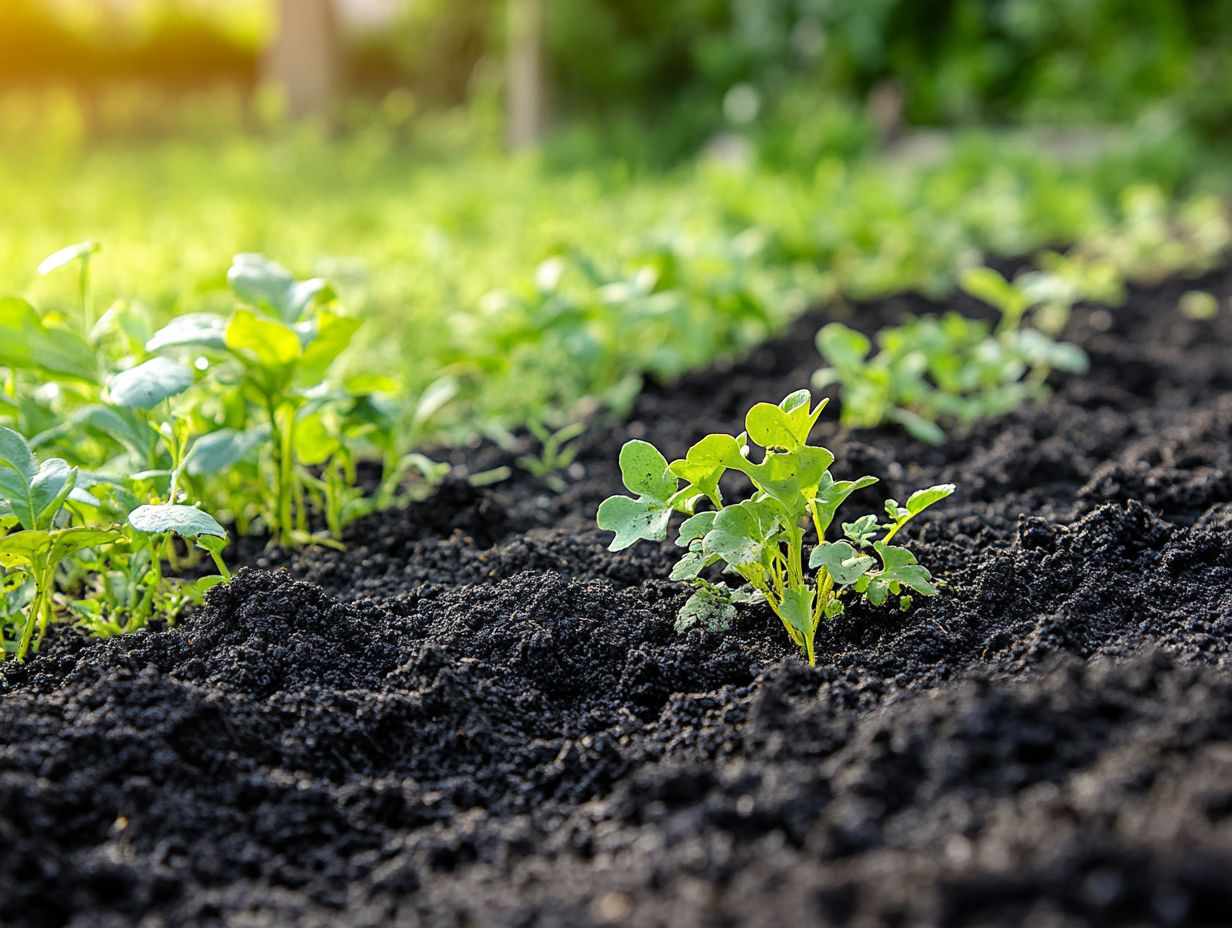
When utilizing biochar, consider the specific soil types at play, as each type behaves differently in response to biochar amendments. This impacts nutrient leaching and overall soil quality, which can influence nutrient absorption and agricultural productivity.
For example, clay soils excel at retaining moisture but often suffer from compaction. Here, biochar can enhance aeration and drainage. Conversely, if you’re dealing with sandy soils, which drain quickly but struggle with nutrient retention, biochar can help them hold onto essential nutrients.
Loamy soils, the goldilocks of soil types, with their balanced mix of sand, silt, and clay, provide an excellent medium for biochar application. Monitor your soil to see how it responds after applying biochar. Pay attention to changes in pH, moisture levels, and nutrient availability, and make necessary adjustments based on your soil’s characteristics and desired crop outcomes.
Potential Challenges and Solutions
While biochar offers numerous benefits for agricultural practices, it also presents challenges and limitations. You may encounter issues such as nutrient leaching, improper application techniques, and soil compaction.
Addressing these concerns is essential for optimizing biochar use in your farming. Effective solutions can enhance its advantages while minimizing potential drawbacks.
Addressing Concerns and Limitations
Tackling the concerns and limitations associated with biochar usage requires an understanding of nutrient management practices, soil health dynamics, and potential risks linked to over-application or improper integration.
While biochar can significantly enhance soil properties, specific issues may arise, such as nutrient imbalances that hinder plant productivity. Be aware that the risk of soil compaction may increase if biochar isn t properly mixed with organic matter.
Ongoing research aims to optimize biochar formulations and application rates to maximize beneficial effects while minimizing negative outcomes.
Innovative approaches, like incorporating biochar into compost or using it as a nutrient carrier, can help create more balanced soil profiles. Conduct soil tests before application, regularly monitor soil health, and adjust practices based on continuous feedback to ensure the sustainable use of biochar.
Frequently Asked Questions
Have more questions? Reach out and let s talk!
What is biochar and how does it enhance soil quality?
Discover the magic of biochar! This charcoal made from natural materials like wood chips can transform your soil. When added to soil, it improves quality by increasing water retention, nutrient availability, and microbial activity.
How do I use biochar to enhance soil quality?
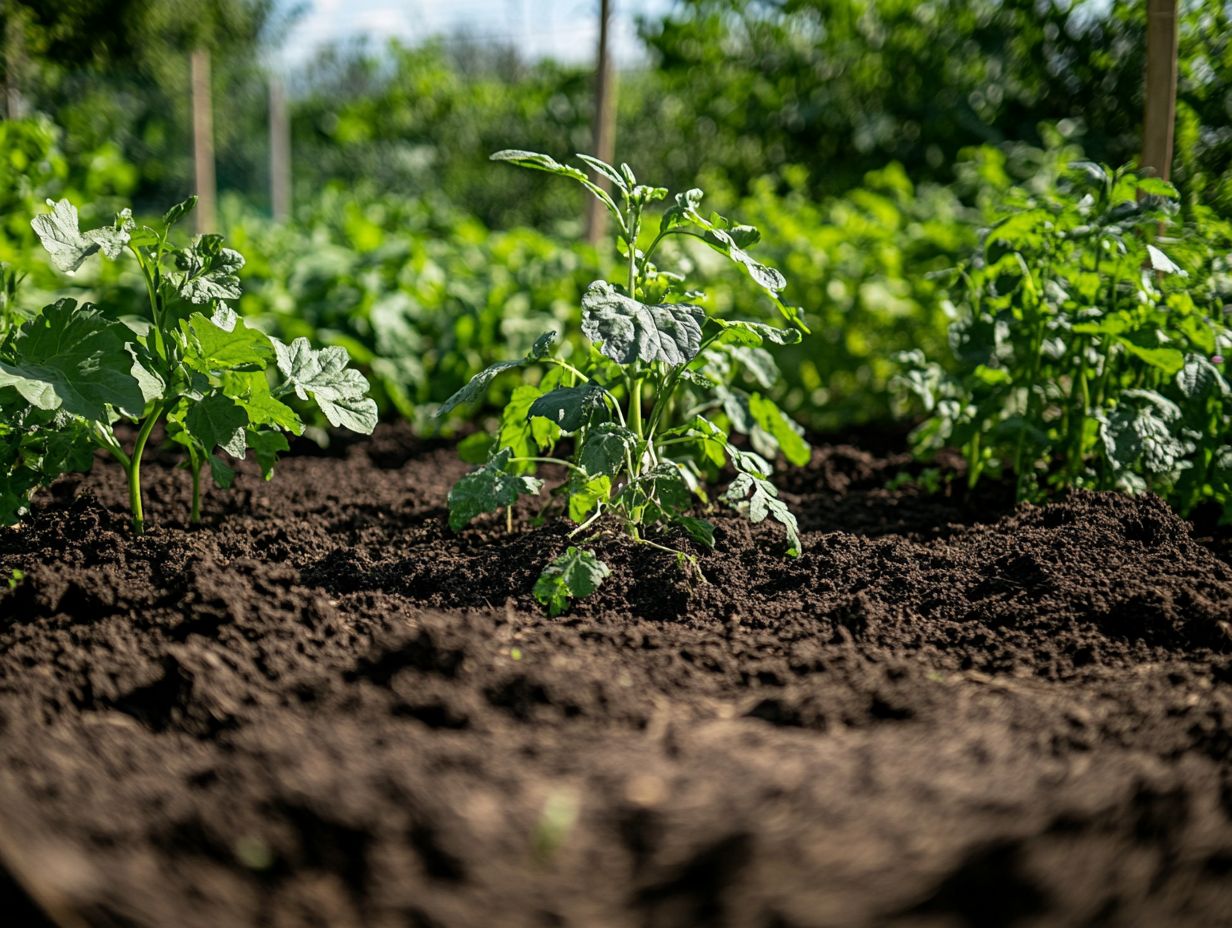
You can use biochar in several ways. This includes mixing it into the soil, applying it as a top dressing, or making biochar compost based on your soil and crop needs.
What are the benefits of using biochar to enhance soil quality?
Biochar offers many benefits for soil. It improves soil structure, reduces erosion, and boosts nutrient retention. It can also promote plant growth and help mitigate climate change by storing carbon in the soil.
Can biochar be used in all types of soil?
Yes! You can use biochar in sandy, clay, or loamy soils. However, the application rate may vary depending on the specific soil type and nutrient needs.
Is biochar safe to use in my garden or farm?
Absolutely! Biochar is safe for gardens and farms. It is a natural product free of harmful chemicals and toxins. Just be sure to purchase it from a trusted source to ensure quality.
How often should I apply biochar to my soil?
The frequency of biochar application depends on your soil and plants specific needs. Some soils may benefit from annual applications, while others may only need it every few years. A soil test can help determine the appropriate rate and frequency.
Start improving your garden today with biochar and watch your plants thrive!



